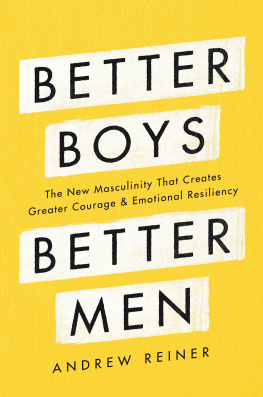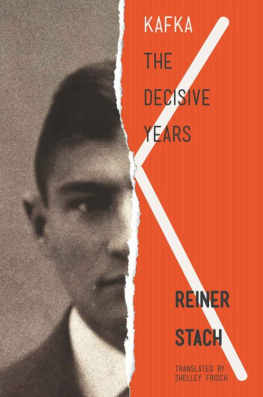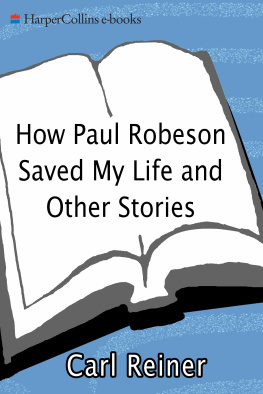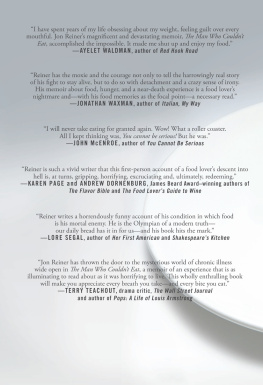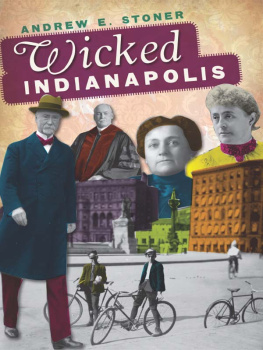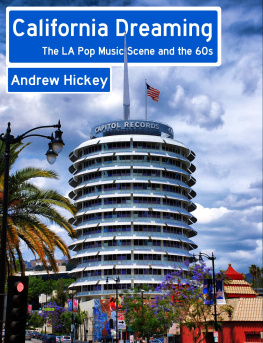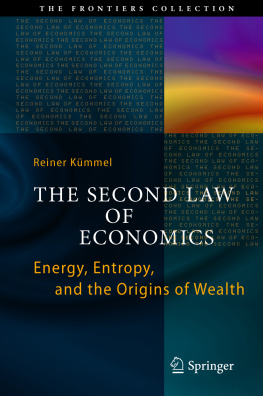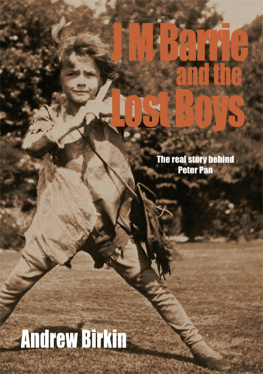Andrew Reiner - Better Boys, Better Men
Here you can read online Andrew Reiner - Better Boys, Better Men full text of the book (entire story) in english for free. Download pdf and epub, get meaning, cover and reviews about this ebook. year: 2020, publisher: HarperOne, genre: Children. Description of the work, (preface) as well as reviews are available. Best literature library LitArk.com created for fans of good reading and offers a wide selection of genres:
Romance novel
Science fiction
Adventure
Detective
Science
History
Home and family
Prose
Art
Politics
Computer
Non-fiction
Religion
Business
Children
Humor
Choose a favorite category and find really read worthwhile books. Enjoy immersion in the world of imagination, feel the emotions of the characters or learn something new for yourself, make an fascinating discovery.
- Book:Better Boys, Better Men
- Author:
- Publisher:HarperOne
- Genre:
- Year:2020
- Rating:4 / 5
- Favourites:Add to favourites
- Your mark:
- 80
- 1
- 2
- 3
- 4
- 5
Better Boys, Better Men: summary, description and annotation
We offer to read an annotation, description, summary or preface (depends on what the author of the book "Better Boys, Better Men" wrote himself). If you haven't found the necessary information about the book — write in the comments, we will try to find it.
Andrew Reiner: author's other books
Who wrote Better Boys, Better Men? Find out the surname, the name of the author of the book and a list of all author's works by series.
Better Boys, Better Men — read online for free the complete book (whole text) full work
Below is the text of the book, divided by pages. System saving the place of the last page read, allows you to conveniently read the book "Better Boys, Better Men" online for free, without having to search again every time where you left off. Put a bookmark, and you can go to the page where you finished reading at any time.
Font size:
Interval:
Bookmark:
To Elizabeth and Macallah,
my beloved muses and oak beams
The hallways hadnt changed at the Sheridan School. There hadnt been any construction or new additions in this K8 private school in Northwest Washington, DC. And Harrisons head and vision were fine. Yet the thenseventh grader told me, Sometimes, when I come out of classes, I feel like I dont know where I am. It doesnt last long or anything. But for a few seconds Im a little, I dont know...
He squinted his eyes and tilted his head, as he often did when he concentrated.
Disoriented, interjected Nico, his friend and fellow seventh grader.
Yeah, thats right, said Harrison. Disoriented.
Why is that? I asked.
Most of the time it feels like this is the school Ive always known, Harrison told me. But sometimes it feels like someplace Ive never been before.
Nico nodded.
When you interview people about themselves, often you get a self-conscious, airbrushed version of the truth. Not with these two. Theyre part of an affinity groupcalled Boys Groupthat meets once a week to unpack the challenges, complexities, and limitations of traditional forms of masculine identity. (Sheridan offers many affinity groups, including a feminist-focused group called Fem.)
Over the course of a school year, I observed the group three times and regularly interviewed Harrison and Nico.
Why do you guys feel like you dont recognize this school? I asked.
Harrisons face flushed, just as it always did when he grew frustrated or upset. Were constantly being told that we have to watch everything we say and do, he said. We get it from Fem and from teachers.
Thats true, sometimes, said Nico, who always led with a critical objectivity well beyond his years. Weve had teachers question our understanding of things we discuss in class because were white males.
Harrison could barely contain himself at this point. And the girls from Fem make fun of us for being girly!
On the surface, this middle school baiting may sound harmless (silly, even) enough, but for most males, regardless of age or race, socioeconomic class or classroom, it isnt. Ive come to learn its particularly devastating for early adolescent males. They have to deal with the double burden of establishing a masculine identity, while simultaneously enduring the sting of their peers and often teachers challenging or questioning that burgeoning masculine identity.
Nico shook his head, then looked at Harrison. Thats kinda ironic coming from people who expect sensitivity for everyone else, huh?
I had never seen Nico as down as I did during this conversation. After a few quiet moments, he continued, his gaze turned downward. Ive been taught to support womens equality and equality for people of color since I was in kindergarten. I totally get the need to share the stage, he said. And I agree with all of it. I really do.
Me, too, mostly, Harrison said, nodding.
But sometimes it makes me feel like Im kind of a stranger here, Nico said.
See! Its not just me! Harrison bellowed, smiling.
From previous conversations with Harrison, I knew that this was far more than joy at being vindicated. It was relief atas he often told me when he examined the benefits of this groupnot feeling so alone with my own feelings.
Nico continued. And Ive been in school here since I was really little. I mean, I see girls walking through school wearing T-shirts that say, The Future Is Female, and Im like, Okay, I completely support feminism. But where does that leave me? Where does that leave guys? Where are we in that future?
* * *
This isnt merely the anxious hand-wringing of an exceptionally aware and thoughtful middle-school-aged boy. These are the same existential questions plaguing boys and men of all ages everywhere today, including those of us who have been struggling for decades to create healthier expressions of masculinity.
I speak from experience.
I grew up the youngest of fouran older sister, two older brothers, then me. Because my father traveled across the state of Maryland shilling aluminum siding door to door, he was absent from the dinner table most weeknights. This wasnt always a bad thing, since our father was a man whose inner demons defined him and were given full run at the dinner table, where we ate in fear that an incorrectly held fork or a slurp or plates filled with too much food or too little would be met with a full-throttled fury that drove us from the table. My oldest brother tried to fill our fathers absence, inciting a reign of terror in his own adolescent male image. He criticized everything we said and everything we did. He sneered at our sisters kind hippie boyfriends. He made fun of our middle brother, who was overweight. I was very young, a highly sensitive and anxious child, and was cowed by anything that suggested failure. If my brother was a wolf, I was his endless supply of limping deer. Nothing goaded him more about me (and informs the way he sees me to this day) as much as a fistfight I got into with a neighborhood boy my age when I was seven or eight. Given how very young we were, it was a brutal, humiliating brawl. Three times this boy commanded me to beg for mercy on my knees and promised to end the fight if I relented; three times I did this, and he responded with yet more blows to my face and headall in front of the entire neighborhood of kids. When my oldest brother learned about this, he grew apoplectic, deemed me a disgrace to the family, and never let me live it down. My shame was sealed.
Throughout most of my childhood and even high school, everyonemy friends, my girlfriends, my teachersconsidered me easygoing, carefree, and content. But anytime my oldest brother faced off against me on the basketball court or the football field, I summoned an uncommon rage. And on the days I played on his team, I beat myself up afterward for turning the rage I usually reserved for him on the opponents he and I shared. Every time my brother and I teamed up, I secretly embraced, even reveled in, the Gladiator team name he openly bestowed upon us. I played with a blinding-red fury and tried to prove that I, too, could dominate my opponent. After those games, I felt queasy and as miserable as the evenings at the dinner table when my oldest brother spat his venom. Why the hell was I trying to impress him of all people? What was I trying to prove?
Though I was loath to admit it as I grew older, deep down I knew why. I wanted to show my brother that I was as tough as he was. That I was just as ready to fight or cut someone down as he was. To my consternation and shame, I recognized that I was trying to show my older brother that I was just as much of a man as he was. I wanted him to recognize that I could stand with him shoulder to shoulderor, if it ever came to it, toe to toe.
The rage my brother inspired in me stayed with me for a long time. Consciously and unconsciously I carried it for years. While I kept my head down throughout high school, during my twenties and thirties I tapped into this rage every time some guy, friend or stranger, tried to impose his hypermasculine agenda on me (sometimes others within earshot). I couldnt let bullying or taunting go unchecked. When I taught middle school, I swooped down with relish on the bigger, stronger, and cooler boys anytime they tormented the less athletic, shy, and bookish kids. When I played in thirty-and-over baseball and basketball leagues, my blinding-red fury overwhelmed me when an opponent, or teammate, tried to shame other guys who didnt play at the same caliber as their bellicose teammates. If I was a Gladiator, at least now I was on the right team. Right?
It took the birth of my son, Macallah, for me to realize that, regardless of what I told myself, I, too, was guilty of practicing a form of unhealthy, unproductive masculinity that rivaled that of my oldest brother.
Font size:
Interval:
Bookmark:
Similar books «Better Boys, Better Men»
Look at similar books to Better Boys, Better Men. We have selected literature similar in name and meaning in the hope of providing readers with more options to find new, interesting, not yet read works.
Discussion, reviews of the book Better Boys, Better Men and just readers' own opinions. Leave your comments, write what you think about the work, its meaning or the main characters. Specify what exactly you liked and what you didn't like, and why you think so.

